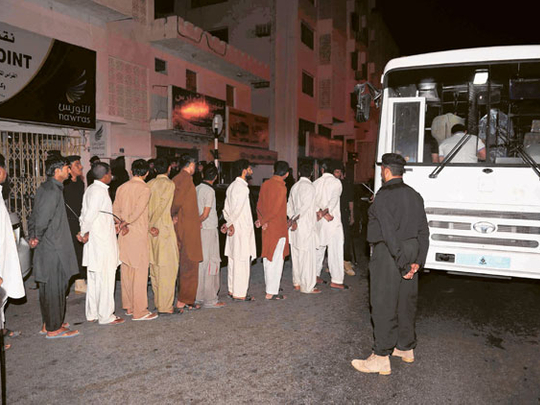
Muscat: The number of absconding workers and illegal residents continues to rise in Oman despite efforts by the local authorities in recent years, including granting an amnesty to leave the country.
A social worker believes making minimum wages mandatory for expatriate employees could help curb the problem of absconding workers. And a senior official at the Manpower Ministry says society should shun illegals and urged employers to comply with the agreements they enter into with their employees.
"Employers are equally responsible for absconding expatriate workers in Oman," Salem Bin Saeed Al Badi, Director General of Labour Welfare at the Manpower Ministry, said in a statement emailed to Gulf News.
"The non-compliance of contractual terms by the employers results in expatriate workers running away from their sponsors," he said.
The Manpower Ministry official also said they had formed a joint team with Royal Oman Police (ROP) and have raided several places to find illegal residents. "We have raided workers' accommodation even at two in the morning after due permission from the Public Prosecution," he added.
‘Free visa'
Al Badi said during interrogations of illegal residents and absconding workers it was clear some employers did not follow the country's labour laws. "One obvious reason behind absconding workers is employers' failure to fulfil legal obligations," he said, adding that some neither pay salaries on a regular basis nor provide decent accommodation.
"The workers then abscond out of frustration and start working illegally," he said.
He also referred to employers who hire workers but have no work to give them. "These workers then do freelance work in the market and the original employer [sponsor] demands monthly fees for providing visas," he pointed out. In the local market, the term for such a visa is ‘free visa' because the sponsor of the visa allows workers to work in the open market for any employer they wish.
Al Badi also complained that some employers were subjecting their expatriate employees, especially drivers, domestic help or farm workers, to longer working hours and arduous work. "This kind of treatment leaves workers with no choice but run away from their employers."
Talking about other reasons workers abscond, he said: "Sometimes a worker disappears after committing theft or embezzling funds from their workplace."
‘Very low pay'
Al Badi also blamed society for encouraging the phenomenon of absconding workers. "People employ these workers and in some cases citizens rent out their properties to the absconding workers," he said.
"If people would not employ absconding expatriates or give them shelter, it would discourage others from absconding," he said.
P.M. Jabir, Indian Social Club's Social Welfare Secretary, feels that non-payment of wages as well as in some cases very low pay force workers to run away from their original employers.
He echoed Al Badi's views on longer hours. "In some cases they work more than 12 hours and are not compensated suitably, so they escape from their sponsors."
Jabir, also a Member of the Kerala Government's Pravasi Welfare Fund Board in India, said workers paid huge amounts of money to recruiting agents to secure employment here.
However, he said low wages resulted in no savings with debt building up back home. "With income low and debt piling up, these workers choose to abscond and work on their own to earn more. The need to make more money forces these workers to abscond," he said.
Shakeer Rahman, who was arrested for absconding by the joint investigating team in Hamriya area, said he worked with his employer for two years. However, the employer wanted to close down the business, so he allowed Shakeer to work outside without transferring his visa. "Now I work at a construction site and earn five to six Omani riyals (Dh46.7) daily against 90 riyals monthly salary paid earlier by my sponsor," he said.
Ill-treatment at the hands of his supervisor made Bilal Hussain, a construction worker, run away. "I was paid 70 riyals monthly salary. Now, I work as a porter and get six to seven riyals a day," he said.












